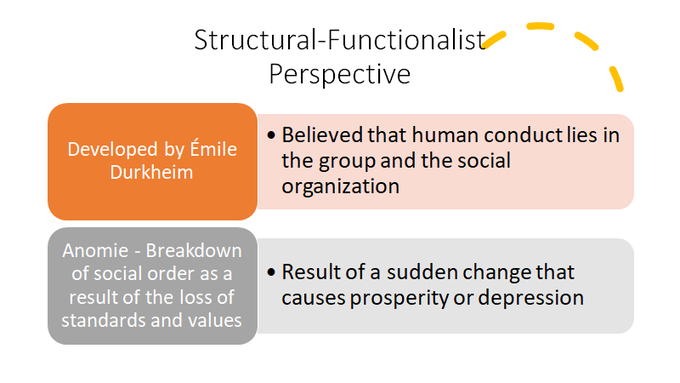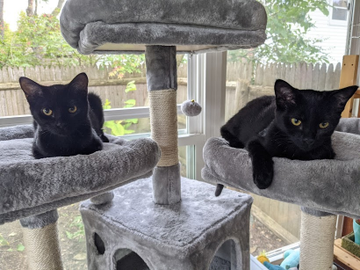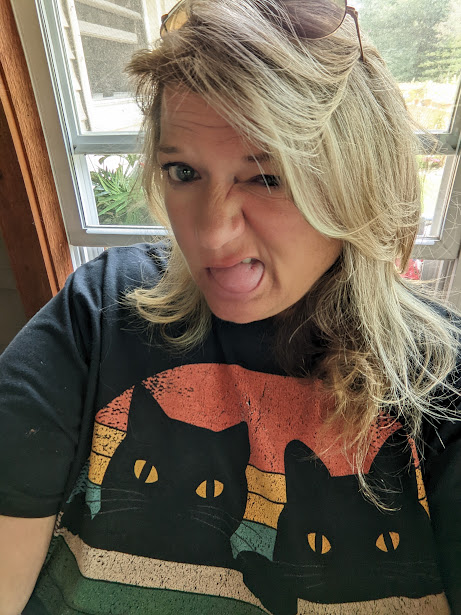Good morning! Today, 10:30am, cst, we are taking a look at social class, crime, and the #AmericanDream.
Do YOU believe in the American Dream?
#CRJ105 #MoraineValley #SocialStructure #Strain
Do YOU believe in the American Dream?
#CRJ105 #MoraineValley #SocialStructure #Strain
Good morning, I have office hours in A109 this morning, I'll be here live tweeting for criminology and then listening to the colleges presentation on the situation in the Ukraine. I'm glad you can join me
#CRJ105
#CRJ105

I'll be updating the gradebook for Unit 02, I should finish tomorrow, so keep an eye on your grades, I'm happy to answer any questions.
Let's jump into #StrainTheory #CRJ105
Let's jump into #StrainTheory #CRJ105
The biological and psychological theories of criminal behavior share the assumption that such behavior is caused by some underlying physical or mental condition that separates the criminal from the noncriminal
#MoraineValley #CRJ105
#MoraineValley #CRJ105

Which means that up to to this point, we have really been looking at the INDIVIDUAL offender, the potential offender's unique choices, biological, and psychological traits
#MoraineValley #CRJ105
#MoraineValley #CRJ105
Biological and psychological theories do NOT explain why crime rates vary from one neighborhood to the next, from group to group, within large urban areas, or within groups of individuals
#MoraineValley #CRJ105
#MoraineValley #CRJ105
Biological and psychological theories do NOT explain why crime rates vary from one neighborhood to the next, from group to group, within large urban areas, or within groups of individuals
#MoraineValley #CRJ105
#MoraineValley #CRJ105

These theories can be grouped into three general categories: strain, cultural deviance, and social control.
#MoraineValley #CRJ105
#MoraineValley #CRJ105

So grab your cup of tea, pull up your notebook to take some notes, grab a pencil to jot down questions, let's start to take a look at how we develop throughout our lives & how we interact with our environment
#MoraineValley #CRJ105 #SocialStructure
#MoraineValley #CRJ105 #SocialStructure
For me, I'd include:
~ Friendly
~ Hardworking
~ Patriotic
~ Duty-driven
~ Compassionate
#MoraineValley #CRJ105 #SocialStructure
~ Friendly
~ Hardworking
~ Patriotic
~ Duty-driven
~ Compassionate
#MoraineValley #CRJ105 #SocialStructure
THINKING CHALLENGE: What forces in your life were most influential in shaping your personality?
#MoraineValley #CRJ105 #SocialStructure
#MoraineValley #CRJ105 #SocialStructure
For me, personally, I am friendly & compassionate because of my supportive family
#MoraineValley #CRJ105 #SocialStructure


#MoraineValley #CRJ105 #SocialStructure



The reason I ask you to consider this exercise is that we are going to explore the concept of #Socialization
#MoraineValley #CRJ105 #SocialStructure


#MoraineValley #CRJ105 #SocialStructure



Socialization examines how our life experiences and interactions help us develop as an individual
#MoraineValley #CRJ105 #SocialStructure
#MoraineValley #CRJ105 #SocialStructure

An individual isn't BORN with particular traits that make them more likely to break the law
(ahem biological & psychological trait theory, we're looking at you!)
rather ... we are shaped into criminal choices by interactions with our environment
#MoraineValley #CRJ105
(ahem biological & psychological trait theory, we're looking at you!)
rather ... we are shaped into criminal choices by interactions with our environment
#MoraineValley #CRJ105
Some common forces and institutions that shape our development:
Family! The individuals with whom you spend formative years and influence your life as an adult
#MoraineValley #CRJ105
Family! The individuals with whom you spend formative years and influence your life as an adult
#MoraineValley #CRJ105
Family may be biological, it may be social, and often changes throughout the duration of our life.
#MoraineValley #CRJ105 #SocialStructure

#MoraineValley #CRJ105 #SocialStructure


Another influence on many individual's socialization is their education. This may be related to the chosen curriculum, but also school performance is linked to self-esteem and sense of life opportunity
#MoraineValley #CRJ105 #SocialStructure
#MoraineValley #CRJ105 #SocialStructure

THINKING CHALLENGE: What was the most significant aspect of school in shaping the way you see the world?
#MoraineValley #CRJ105 #SocialStructure
#MoraineValley #CRJ105 #SocialStructure
Did you have a teacher that changed your life for the worse or better?
#MoraineValley #CRJ105 #SocialStructure
#MoraineValley #CRJ105 #SocialStructure
Institutional involvement is extremely formative for many individuals. This may be as formal as a religious practice or even an informal membership of shared values & norms
#MoraineValley #CRJ105 #SocialStructure
#MoraineValley #CRJ105 #SocialStructure

Most certainly, who we spend our time with, our chosen friends, say a lot about who we are as a person.
Who is that friend that always pushes you to do better?
#MoraineValley #CRJ105 #SocialStructure
Who is that friend that always pushes you to do better?
#MoraineValley #CRJ105 #SocialStructure
My friendship with @TwoFox15 has been extremely influential in my life, she keeps me motivated (& laughing) through a lot of stress. I apparently have NO photos of our Zoom calls!
#MoraineValley #CRJ105 #SocialStructure
#MoraineValley #CRJ105 #SocialStructure

My morning 'have a good day' exchanges with my coffee friends remind me that there is something good in every day
@Dan_Sinisi
@RealDesmondRyan
@ChiefBurr101
@MargaretMilbur1
@AutismCop
@PaladinShow
@108Charger
@dworakt
@bpridgeo
#MoraineValley #CRJ105 #SocialStructure
@Dan_Sinisi
@RealDesmondRyan
@ChiefBurr101
@MargaretMilbur1
@AutismCop
@PaladinShow
@108Charger
@dworakt
@bpridgeo
#MoraineValley #CRJ105 #SocialStructure
We will examine family, friends, faith, & education as sources of socialization ... but where we are going to start ...
how does your community & social class affect your lifestyle, life choices, and criminality?
#MoraineValley #CRJ105 #SocialStructure
how does your community & social class affect your lifestyle, life choices, and criminality?
#MoraineValley #CRJ105 #SocialStructure

Sociological theories seek the reasons for differences in crime rates in the social environment.
#MoraineValley #CRJ105 #SocialStructure #SocialClass
#MoraineValley #CRJ105 #SocialStructure #SocialClass
A social class is a set of concepts centered on models of social stratification, in which people are grouped into a set of hierarchical social categories
#MoraineValley #CRJ105 #SocialStructure #SocialClass
#MoraineValley #CRJ105 #SocialStructure #SocialClass

The most common distinctions being the upper, middle and lower classes
#MoraineValley #CRJ105 #SocialStructure
#MoraineValley #CRJ105 #SocialStructure

THINKING CHALLENGE: How does your social class affect your lifestyle?
#MoraineValley #CRJ105 #SocialStructure
#MoraineValley #CRJ105 #SocialStructure
Sociological theories can be grouped into three general categories: strain, cultural deviance, and social control.
#MoraineValley #CRJ105 #SocialStructure
#MoraineValley #CRJ105 #SocialStructure

One way of studying a society is to look at its component parts in an effort to find out how they relate to one another.
In other words, researchers look at the structure of a society to see how it functions
#MoraineValley #CRJ105 #SocialStructure
In other words, researchers look at the structure of a society to see how it functions
#MoraineValley #CRJ105 #SocialStructure

The structural-functionalist perspective was developed by Émile Durkheim (1858–1917) before the end of the nineteenth century.
#MoraineValley #CRJ105 #SocialStructure
#MoraineValley #CRJ105 #SocialStructure

To Durkheim, the explanation of human conduct, and indeed human misconduct, lies not in the individual but in the group and the social organization
#MoraineValley #CRJ105 #SocialStructure
#MoraineValley #CRJ105 #SocialStructure

The most important of Durkheim’s many contributions to contemporary sociology is his concept of anomie, a breakdown of social order as a result of a loss of standards and values.
#CRJ105 #MoraineValley #SocialStructure
#CRJ105 #MoraineValley #SocialStructure
Anomie occurs when society's previously held norms shift or disintegrate
#CRJ105 #Criminology #MoraineValley #SocialStructure
#CRJ105 #Criminology #MoraineValley #SocialStructure

A functional society requires many facets to work in coordination with one another
#CRJ105 #Criminology #MoraineValley #SocialStructure
#CRJ105 #Criminology #MoraineValley #SocialStructure

Does ANOMIE theory make sense, meaning is this concept clear to you?
#CRJ105 #Criminology #MoraineValley #SocialStructure
#CRJ105 #Criminology #MoraineValley #SocialStructure
“Strain theory,” the name given by contemporary criminologists to Merton’s explanation of criminal behavior, assumes that people are law-abiding but when under great pressure will resort to crime
#CRJ105 #MoraineValley #SocialStructure #Strain
#CRJ105 #MoraineValley #SocialStructure #Strain

Putting this in the larger frame of social structure theories that explain crime by reference to the institutional structure of society
The various formal and informal arrangements between social groups are seen as the root causes of crime and deviance. #CRJ105 #MoraineValley
The various formal and informal arrangements between social groups are seen as the root causes of crime and deviance. #CRJ105 #MoraineValley

Strain theory sees delinquency as a form of adaptive, problem-solving behavior, usually committed in response to problems involving frustrating and undesirable social environments.
#CRJ105 #MoraineValley #SocialStructure #Strain
#CRJ105 #MoraineValley #SocialStructure #Strain

Strain makes the argument that access to money may not buy happiness, but it makes a lot easier
#CRJ105 #MoraineValley #SocialStructure #Strain
#CRJ105 #MoraineValley #SocialStructure #Strain

THINKING CHALLENGE: Do you know that ONE really good looking friend who seems like life just a little easier for him/her because of their good looks?
#CRJ105 #MoraineValley #SocialStructure #Strain
#CRJ105 #MoraineValley #SocialStructure #Strain
Strain theory argues that life, in general, just goes a little easier for people who have money. Sure, they have problems, but not problems they can't solve!
#CRJ105 #MoraineValley #SocialStructure #Strain
#CRJ105 #MoraineValley #SocialStructure #Strain
The most common representation of the values of the middle class is the #AmericanDream.
Do you believe you have access to the American Dream?
#CRJ105 #MoraineValley #SocialStructure #Strain
Do you believe you have access to the American Dream?
#CRJ105 #MoraineValley #SocialStructure #Strain
Do you believe all Americans have EQUAL access to the American Dream?
#CRJ105 #MoraineValley #SocialStructure #Strain
#CRJ105 #MoraineValley #SocialStructure #Strain
Does the American Dream exist? Is it available to everyone?
#CRJ105 #MoraineValley #SocialStructure #Strain
#CRJ105 #MoraineValley #SocialStructure #Strain
Merton suggested that #anomie involved a disjunction between legitimate goals, which everyone desires, and socially approved means to success, which are not equally available to all members of society.
#CRJ105 #MoraineValley #SocialStructure #Strain
#CRJ105 #MoraineValley #SocialStructure #Strain

Individuals’ responses depend on their attitudes toward the cultural goals and the institutional means of attaining those goals. The options are
~conformity,
~innovation,
~ritualism,
~retreatism,
~and rebellion.
#CRJ105 #MoraineValley #SocialStructure #Strain
~conformity,
~innovation,
~ritualism,
~retreatism,
~and rebellion.
#CRJ105 #MoraineValley #SocialStructure #Strain

Conformity is the most common mode of adjustment. Individuals accept both the culturally defined goals and the prescribed means for achieving those goals
#CRJ105 #MoraineValley #SocialStructure #Strain

#CRJ105 #MoraineValley #SocialStructure #Strain


Individuals who choose the adaptation of innovation accept society’s goals, but because they have few legitimate means of achieving them, they design their own means for getting ahead.
#CRJ105 #MoraineValley #SocialStructure #Strain

#CRJ105 #MoraineValley #SocialStructure #Strain


People who adapt by ritualism abandon the goals they once believed to be within reach and resign themselves to their present lifestyles. They play by the rules
#CRJ105 #MoraineValley #SocialStructure #Strain

#CRJ105 #MoraineValley #SocialStructure #Strain


People who adapt by ritualism abandon the goals they once believed to be within reach and resign themselves to their present lifestyles. They play by the rules
#CRJ105 #MoraineValley #SocialStructure #Strain
#CRJ105 #MoraineValley #SocialStructure #Strain
Retreatism is the adaptation of people who give up both the goals (can’t make it) and the means (why try?) and retreat into the world of drug addiction or alcoholism
#CRJ105 #MoraineValley #SocialStructure #Strain

#CRJ105 #MoraineValley #SocialStructure #Strain


Many research studies designed to test the various propositions of strain theory focus on the association between social class and and delinquency
#CRJ105 #MoraineValley #SocialStructure #Strain
#CRJ105 #MoraineValley #SocialStructure #Strain

THINKING CHALLENGE: Can Merton's Strain Theory explain why wealthy people break the law?
#CRJ105 #MoraineValley #SocialStructure #Strain
#CRJ105 #MoraineValley #SocialStructure #Strain
Messner & Rosenfeld agree with Merton that the material success goal is pervasive in American culture. In essence, the American dream is quite clear, succeed by any means necessary, even if those means are illegitimate
#CRJ105 #MoraineValley #SocialStructure #Strain
#CRJ105 #MoraineValley #SocialStructure #Strain
Do people with means & financial resources EVER experience stress?
What is a non-financial form of stress?
#CRJ105 #MoraineValley #SocialStructure #Strain
What is a non-financial form of stress?
#CRJ105 #MoraineValley #SocialStructure #Strain
And if you made it this far, send me your best picture of what 'the American Dream' means to you!
#CRJ105 #MoraineValley #SocialStructure #Strain


#CRJ105 #MoraineValley #SocialStructure #Strain



We will take a look at cultural deviance, concluding Chapter 05, next week!
#CRJ105 #MoraineValley #SocialStructure #Strain
#CRJ105 #MoraineValley #SocialStructure #Strain
• • •
Missing some Tweet in this thread? You can try to
force a refresh
















